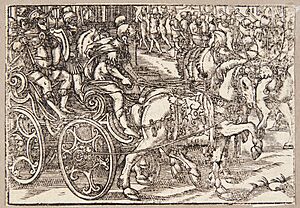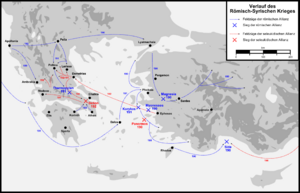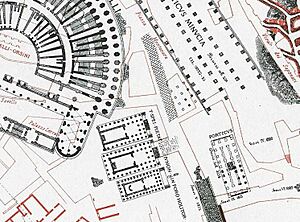Manius Acilius Glabrio (consul 191 BC) facts for kids

Manius Acilius Glabrio was an important Roman politician and general during the time of the Roman Republic. He was a "plebeian," meaning he came from a common family, not one of the old noble families. In 191 BC, he became a consul, which was one of the highest positions in the Roman government.
At this time, Rome was fighting a big war against the Seleucid Empire, led by Emperor Antiochus III the Great. Manius Acilius Glabrio led the Roman army to a major victory at a place called Thermopylae. This win helped Rome become the most powerful force around the Mediterranean Sea. Because of his success, he was given a special celebration called a triumph.
Later, he faced some accusations about how he handled treasures from his conquests in Greece. These accusations made him decide not to run for another important job called censor. After this, he mostly stayed out of public life.
Manius Acilius Glabrio and his son helped build a temple in Rome called the Temple of Piety. It was next to the Forum Olitorium, which was a vegetable market. A special golden statue of Acilius Glabrio was placed there. It was the first time a Roman citizen had a golden statue in the city.
Contents
Manius Acilius Glabrio: A Roman General
Manius Acilius Glabrio was born in the 3rd century BC. His family was plebeian, meaning they were not from the old noble families of Rome. He was the first person in his family to become a consul. This made him a "new man" (novus homo in Latin), which was a big achievement.
His Early Life and Career
Glabrio started his political career as a tribune of the plebs in 201 BC. This role protected the rights of common people. Later, in 197 BC, he became a plebeian aedile. Aediles were in charge of public buildings, games, and markets.
In 196 BC, he served as a praetor peregrinus. This was a judge who handled cases involving foreigners. During this time, he also stopped a slave revolt in a region called Etruria.
The War Against Antiochus

In 191 BC, Manius Acilius Glabrio was elected consul along with Publius Cornelius Scipio Nasica. At this time, a group called the Aetolian League had invited Emperor Antiochus III of the Seleucid Empire to come to Greece. They wanted him to help them against Rome.
The Roman Senate decided to go to war with Antiochus. Glabrio was chosen to lead the Roman army. He sailed to Greece and landed in Thessaly. There, he fought and defeated Antiochus at the famous Battle of Thermopylae. This forced Antiochus to retreat across the Aegean.
After this victory, Glabrio moved against the city-states of the Aetolian League that had fought against Rome. He captured the city of Heraclea. He tried to make peace, but when that failed, he began to besiege another city called Naupactus.
Later, a former consul named Titus Quinctius Flamininus helped arrange a truce. This allowed the Aetolians to send people to Rome to talk about peace. Glabrio agreed, lifted the siege, and sent his own representatives to Rome. However, the peace talks did not work out, and the war continued.
Glabrio stayed in Greece as a proconsul for another year to continue the fighting. He also gave gifts to the famous Delphi and its oracle. The Romans believed he treated the Greeks fairly. When he returned to Rome, he was given a grand triumph to celebrate his victory. This defeat of Antiochus helped Rome become the main power in the Mediterranean region.
The Roman Calendar
While he was consul, Glabrio also helped pass a law called the lex Acilia. This law gave the college of pontiffs, a group of priests, the job of managing the Roman calendar. This was important because sometimes the calendar was changed by the Senate for political reasons. This could speed up or delay elections, or change how long people stayed in office. The calendar could also get out of sync with the seasons.
His Later Life
In 189 BC, after his time as proconsul, Glabrio tried to become a censor. This was a very powerful position. Censors were in charge of public morals, managing public finances, and organizing the census.
However, some officials accused him of hiding some of the war treasures from Greece in his own house. One of his officers even spoke against him. Because of these accusations, he decided to withdraw from the election. From what we know, he then mostly retired from public life. We don't know exactly when he died, but it was likely after 175 BC.
Building the Temple of Piety
After his big victory at Thermopylae, Acilius Glabrio made a promise to build a temple in Rome dedicated to "piety" (pietas in Latin). Piety meant a sense of duty and respect towards gods, family, and country.
His son, also named Manius Acilius Glabrio, finished building the temple in 181 BC. This Temple of Piety was located at the northern end of the Forum Olitorium, which was Rome's vegetable market.
Later, the famous Roman leader Julius Caesar had the temple taken down to make space for what would become the Theater of Marcellus. However, it seems the temple was either moved or rebuilt, because its services are still mentioned much later in Roman history.
Golden Statues in Rome
In front of the Temple of Piety, there was a gilt (gold-covered) statue of Manius Acilius Glabrio. This was a very special honor because it was the first golden statue of a Roman citizen in the city. Some ancient writers even say that Acilius Glabrio introduced the idea of gilding to Roman artists.
His Family's Legacy
Manius Acilius Glabrio's son became a consul in 154 BC. Other members of his family also served as consuls in the later Roman Republic and during the Imperial Age. The Acilii Glabriones family is known for being one of the longest-lasting political families in ancient Rome. Their family lands even gave their name to a modern area of Rome called Acilia, which is between the city center and the ancient port of Ostia.
 | Sharif Bey |
 | Hale Woodruff |
 | Richmond Barthé |
 | Purvis Young |


